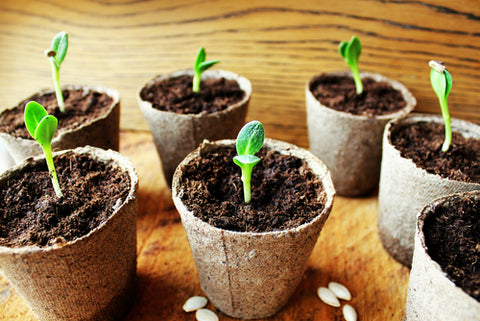Tips for Growing Organic
image by vaivirga/shutterstock
Starting from Seed
They have fancy seed starting kits you can purchase, but if you’re more into the upcycling route, you can start seedlings in things like egg shells, K-cups, jars, or even newspaper.
Getting started with seeds:
-
Try & find non – hybrid seeds as tend to be cheaper. Choose an organic seed, if you can’t find any in your local hardware store, there are many reputable websites that carry them.
-
Some good seeds to start with: Basil, tomatoes, marigolds, beans, beets, carrots, cucumbers, kale, lettuce, peas, radishes
-
Make sure you have good light – they need proper light so place near a sunny window, without good light, they will be weak.
-
Take note of the directions on the back of the seeds – planning & timing is crucial for seeds to thrive – there will also be directions on how deep you need to plant your seeds. Smaller seeds are usually sprinkled on top while larger seeds are usually buried, but again, double check!
-
Start with FRESH soil. Don’t re-use soil, this way you can ensure healthy and disease free seedlings
-
Keep containers moist but not soaking wet – use a mister or small watering can. You can speed up the germination process by covering your planting containers with plastic wrap or a plastic container, this will help keep everything nice and moist. Remove once you see some green starting to sprout.
-
Keep soil moist – but let dry between watering. You can even set up a fan to develop good air movement. You can also feed the seedlings an organic fertilizer.
-
Don’t forget the light! Rotate regularly if using natural sunlight. A desk lamp can even do, just make sure they aren’t too close to the seedlings and keep lit for about 15 hours a day.
-
When ready to move outside, put them in a protected spot – somewhere partly shady and away from high wind areas – keep them here for a few hours and bring them back in at night time. Over 10 days or so, gradually introduce them more and more to the elements. This is called “hardening off”
Easy compost
Plants really love eggshells! Next time you are going to compost or toss these out, feed them to your plants – they will thank you!
Organic Fertilizers
It’s important to keep the proper balance of nutrients for your plants. You can always use compost as a natural fertilizer, however, there are multiple organic fertilizers you can purchase as well. To start you own compost pile – check this blog out.
Weeds
Organic gardening usually goes hand in hand with weeds. Don’t be discouraged! There are tons of natural ways to kill weeds
-
Homemade weed killer – 2 cups white vinegar, half cup of salt, and a tad dish soap. Shake well in a spray bottle and make sure salt is dissolved. Use only on weeds – as this could kill any veggie plants you’re growing!
-
Pull em out! – Pull them out from the root. This is usually the best way to go when you have a raised veggie bed or container. Always use gloves for this to prevent any splinter type stalks/roots you may come across!
Heat
Use leftover boiling water (like from pasta or a tea kettle) and dump right onto the weeds – do it right away so the water is still at a high temperature. Be smart about it, and watch for your feet and lower legs, children, and pets.
Grow what you eat
Plan your garden with things you love to eat and buy often.
Starting Small
Start small with your garden if you’re a beginner. I suggest starting with a 10x10 area, or raised bed. You will be able to harvest more if you take care of a smaller area in the beginning – just until you learn the ropes! You can also opt in for container gardening – this is super ideal for apartment living or saving money by avoiding creating a raised bed. Make sure the containers have holes at the bottom for proper drainage.
Primp & Prune
To keep plants healthy, make sure to prune as needed. Spinach, lettuce and other greens can be harvested multiple times if the outside leaves are snapped off.
Growing organic is one of the best things you can do. Not only do you get the satisfaction from watching something grow, but you are created a healthier environment, and a healthier you!
Some other articles you might enjoy:
Common Compost Questions & HOW TO Compost
Why Cigarette Butts Are a Big Threat to Marine Life
25 Ways to Conserve Water at Home
Sources used:
https://www.almanac.com/content/ten-easiest-vegetables-grow-seed
https://www.gardeners.com/how-to/how-to-start-seeds/5062.html
http://www.naturallivingideas.com/get-rid-of-garden-weeds/
- Gabriella De Luca

